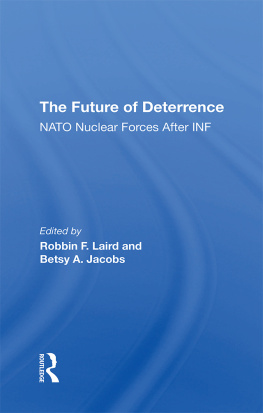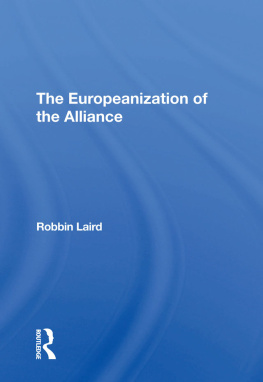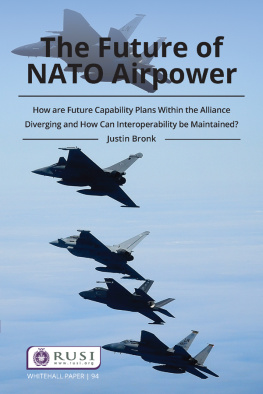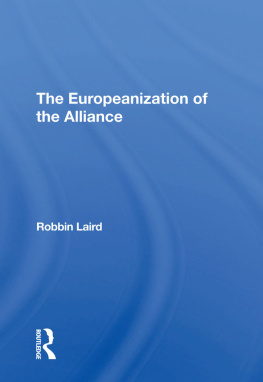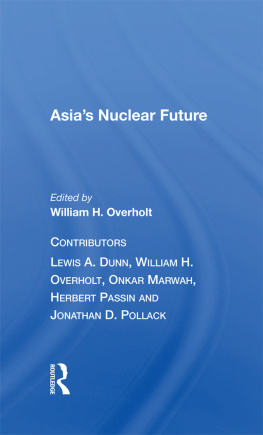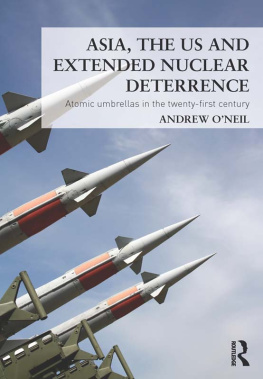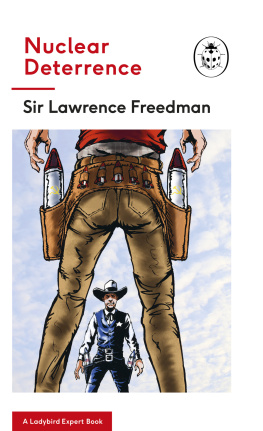The Future of Deterrence
Preparation of this book was supported by a grant from the Central Research Program of the Institute for Defense Analyses.
Other IDA Books
U.S. Security in the Twenty-first Century, Barry M. Blechman
Gorbachev's Agenda: Changes in Soviet Domestic and Foreign Policy, edited by Susan L. Clark
Warranties in Weapon System Procurement: Theory and Practice, Robert E. Kuenne, Paul H. Richanbach, Frederick R. Riddell, and Rachel Kaganoff
The Future of Deterrence
NATO Nuclear Forces After INF
Edited By
Robbin F. Laird and Betsy A. Jacobs
First published 1989 by Westview Press, Inc.
Published 2019 by Routledge
52 Vanderbilt Avenue, New York, NY 10017
2 Park Square, Milton Park, Abingdon, Oxon OX14 4RN
Routledge is an imprint of the Taylor & Francis Group, an informa business
Copyright 1989 Taylor & Francis
All rights reserved. No part of this book may be reprinted or reproduced or utilised in any form or by any electronic, mechanical, or other means, now known or hereafter invented, including photocopying and recording, or in any information storage or retrieval system, without permission in writing from the publishers.
Notice:
Product or corporate names may be trademarks or registered trademarks, and are used only for identification and explanation without intent to infringe.
Library of Congress Cataloging-in-Publication Data
The Future of deterrence: NATO nuclear forces after INF/edited by
Robbin F. Laird and Betsy A. Jacobs.
p. cm. (Westview special studies in national security and
defense policy)
ISBN 0-8133-7772-2
1. North Atlantic Treaty OrganizationArmed ForcesWeapons
systems. 2. Nuclear weaponsEurope. 3. EuropeDefenses.
4. Deterrence (Strategy). I. Laird. Robbin F. (Robbin Frederick),
1946 . II. Jacobs, Betsy A. III. Series.
UA646.3.F877 1989
355.02'17dc20 89-38404
CIP
ISBN 13: 978-0-367-29233-1 (hbk)
To Susan Clark
Contents
Phil Williams
David Robertson
Robbin F. Laird
Robert Grant
W. M. Christenson
Ronald D. Asmus
William Gamer
Robbin F. Laird
- Tables
- Chapter 3
- Chapter 5
- FIGURES
- Chapter 5
The editors would like to express their thanks to a number of colleagues whose insights and comments contributed to the development of the book. Among those who were particularly helpful were Robert Nurick, Vic Utgoff, Mike Clarke, Jorg Baldouf, Jean Chabaud, John Roper, Edwina Moreton, Lawrence Freedman, Francois Heisbourg, and Harley Balzer. We are particularly grateful to General William Y. Smith, President of the Institute for Defense Analyses, for his intellectual encouragement.
We extend warm thanks to Carole Hrabosky and Kathleen O'Boyle for their invaluable assistance in the preparation and editing of the manuscript.
The editors are grateful to the Institute for International and Strategic Studies, the American Foreign Policy Institute, and University Press of America, in whose publications three of the chapters appeared in earlier versions.
We give our fondest thanks to Susan Clark for her constant encouragement and steady effort. For her contributions to our endeavors, we have dedicated this book.
It should be noted that this book was supported by the Central Research Program of the Institute for Defense Analyses. The views expressed in this book are solely those of the authors.
Robbin F. Laird
Betsy A. Jacobs
Dr. Ronald D. Asmus is a specialist on West Germany political and security issues. For a number of years he worked in Munich and has recently joined the Rand Corporation.
Mr. W. M. Christenson is retired from the U.S. Army and is a specialist on tactical and operational military questions. He has worked with the Institute for Defense Analyses for a number of years.
Dr. William Garner is a specialist on Soviet security issues with a PhD from Georgetown University. He authored a book on Soviet perceptions of the INF crisis and is working currently on a general assessment of Soviet threat perceptions.
Dr. Robert Grant is a specialist on European security and international energy issues. He is a Washington-based consultant who has worked with the Institute for Defense Analyses for a number of years.
Dr. Robbin F. Laird is the director of Soviet and European issues at the Institute for Defense Analyses. He has authored more than a dozen books on Soviet, French, British, and West German domestic and foreign policy issues.
Dr. David Robertson is a professor at Oxford University and a specialist in political sociology and strategic affaire. He is a noted expert on British domestic politics as well as on Alliance security issues. He has authored books on political philosophy as well.
Dr. Victor A. Utgoff is a specialist on military and security issues. He has authored many articles on nuclear issues. He has a forthcoming book on chemical weapons issues to be published by McMillan Press and sponsored by the International Institute for Strategic Studies in London.
Dr. Phil Williams is currently the director of security studies at the Royal Institute of International Affairs in London. Beginning in 1989, he will become a professor at the University of Pittsburgh. He is the author of several books and articles on Alliance security issues.
Robbin F. Laird
The Intermediate-range Nuclear Forces (INF) process represents a watershed in West-West and East-West relations. In the aftermath of the INF experience, the future of nuclear deterrence within Europe is currently being debated and future options are being determined. This article assesses the INF process from conception through deployment, to negotiated withdrawal, to provide an understanding of the environment in which the future of nuclear deterrence is being defined.
INF as a Watershed
The 1979 decision by the Western Alliance to pursue modernization of its long-range nuclear systems within Europe and concurrently to pursue arms control negotiations with the Soviet Union was significant for both Alliance relations and East-West relations. For the Alliance, the general consensus supporting nuclear deterrence was replaced by a struggle over the legitimacy of this doctrine, and European powers began to deal more assertively and knowledgeably with the United States on Alliance issues. For East-West relations, the reaction of the Western powers and publics to Soviet blandishments and arms control efforts became a critical element of the "new thinking" of the Gorbachev leadership.
The INF decision also led to a major confrontation in the West between governments and significant segments of public opinion over the legitimacy of nuclear deterrence. For large segments of European public opinion, primarily but not exclusively on the left, the projected deployment of cruise missiles and Pershing IIs represented a significantly worsened, not enhanced, European security. Leftist critics referred to these systems as "American" rather than NATO missiles, which allowed them to focus on the utility to the United States of deploying the new systems, as opposed to any benefits that would accrue to the Alliance from their deployment; to them, the American interest was clearly counterpoised to the European one, and in the early 1980s, Western Europe rang with sincere claims that Europe was being pushed closer to a real war if the American systems were deployed. For the left, the rejection of the American missiles would reduce the threat of nuclear war. For the European governments, the rejection of the NATO missiles would lead to a fundamental rupture in NATO's entire concept of the defense of Europe and would place nuclear deterrence in jeopardy.

